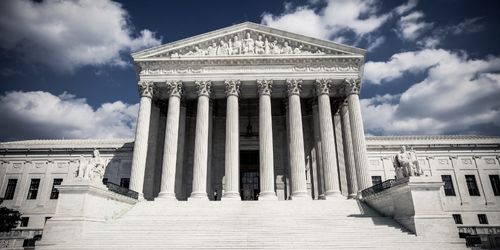|
|
 |
|
|
|
|
Each week, we bring you a collection of the most viewed stories from The Daily Brew, condensed. Here are the top stories from the week of March 20-March 24. |
|
|
|
|
|
|
|
BALLOTPEDIA |
|
|
|
|
|
|
Biden issues first veto of his presidency
|
|
|
|
|
|
|
On March 20, President Joe Biden (D) vetoed the first legislation of his presidency, sending a measure back to Congress that would have prohibited retirement account managers from using certain environmental, social, and corporate governance (ESG) factors to inform investment decisions.
Congress can override a presidential veto with a two-thirds majority vote in both chambers.
Presidents have issued 2,585 vetoes in American history, and Congress has overridden 112. President Franklin D. Roosevelt vetoed 635 bills, the most of any president. Presidents John Adams, Thomas Jefferson, John Q. Adams, William H. Harrison, Zachary Taylor, Millard Fillmore, and James A. Garfield did not issue any vetoes.
Dating back to 1981, President Ronald Reagan (R) issued the most vetoes with 87. Biden has issued the fewest, followed by President Donald Trump (R) with nine.
|
|
|
|
|
|
|
|
|
Litigants in Moore v. Harper submit briefs on SCOTUS' next steps after North Carolina's highest court re-hears case
|
|
|
|
|
|
|
Moore v. Harper is a Supreme Court case involving North Carolina's redistricting process and one of the high-profile SCOTUS cases we're covering in 2023.
The parties in the case filed supplemental briefs with the U.S. Supreme Court on March 20 at SCOTUS' request after the North Carolina Supreme Court announced it would re-hear the case. The briefs outlined each party's view on whether SCOTUS still had jurisdiction in light of the state court's decision. Reuters' Joseph Ax wrote that "If the justices decide they no longer have jurisdiction, they could dismiss the case without issuing a ruling."
The case, which was argued before the U.S. Supreme Court on Dec. 7, concerns the Constitution’s election clause and whether it gives state legislatures sole authority to regulate federal elections without oversight from state courts. North Carolina House Speaker Timothy Moore (R) and a group of Republican legislators brought the case before SCOTUS after the North Carolina Supreme Court ruled 4-3 in February 2022 that the congressional boundaries the Republican-controlled legislature adopted in 2021 were unconstitutional. The North Carolina Supreme court had a 4-3 Democratic majority at the time.
After overturning the original congressional district boundaries, the state supreme courtsent the case back to the trial court for further proceedings. In February 2022, the Wake County Superior Court adopted congressional districts that three court-appointed former judges had drawn. Those districts were used for the 2022 elections.
As a result of the 2022 elections, the North Carolina Supreme Court changed partisan control from a 4-3 Democratic majority to a 5-2 Republican majority. In February 2023, that court agreed to re-hear its decision overturning the district boundaries. The court re-heard oral arguments on March 14.
|
|
|
|
|
|
|
|
|
Jacksonville’s mayoral election advances to a runoff
|
|
|
|
|
|
|
Donna Deegan (D) and Daniel Davis (R) advanced from Tuesday's election and will face each other in a runoff on May 16. With 100% of precincts reporting, Deegan received 39% of the vote, and Davis received 25%. Six other candidates, including one Democrat and three Republicans, also ran.
Incumbent Mayor Lenny Curry (R) was term-limited.
In Jacksonville, all candidates run in the general election regardless of party affiliation. If no candidate wins more than 50% of the vote, the top two vote-getters advance to a runoff.
Broken down by party, Democratic candidates received a combined 48% of the vote in Tuesday’s election, while Republican candidates received a combined 51%. Candidates not affiliated with any party received 1%.
|
|
|
|
|
|
|
|
|
|
Access to Ballotpedia is free 365 days per year... but Ballotpedia is not free to operate. Every dollar given to Ballotpedia helps ensure we continue to expand our coverage of all elections in the United States. Provide your support today and give the gift of unbiased political and policy information to all Ballotpedia readers. |
|
|
|
|
|